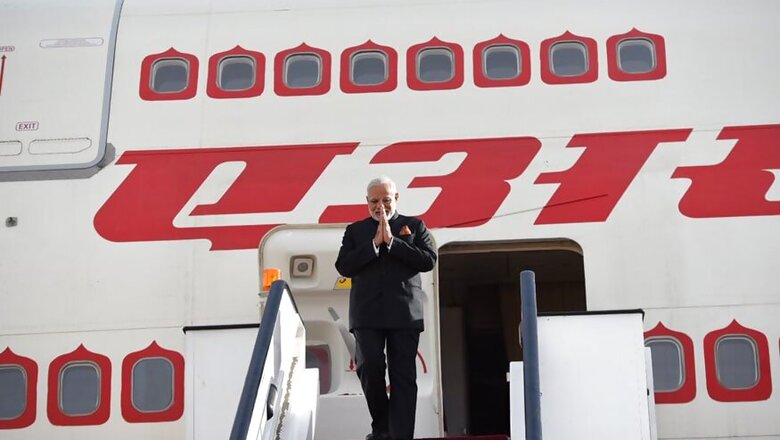
views
New Delhi: Pakistan on Wednesday rejected India's request to allow Prime Minister Narendra Modi's VVIP flight to use its airspace for his upcoming visit to the United States via Germany, citing "the current situation in Kashmir".
"India had requested Pakistan to allow Modi to use its airspace to travel to Germany on September 21 and return on September 28," Foreign Minister Shah Mehmood Qureshi said.
Announcing the decision via a video statement, Qureshi said the Indian High Commissioner in Islamabad had been informed of the decision to not allow Modi's special Air India One aircraft to fly over the country.
"In the light of the current situation in Kashmir, India's attitude and atrocities there, we have decided to not allow our airspace for the flight of the Indian prime minister," he said.
Modi will travel to the US on September 21 to attend the 'Howdy Modi' diaspora event on September 22 along with US President Donald Trump. He will also address the United Nations General Assembly in New York on September 27.
The Indian government said it "regretted" Pakistan's decision to not allow Modi's plane to use its airspace.
"We regret the decision of the government of Pakistan to deny overflight clearance for the VVIP special flight for a second time in two weeks, which is otherwise granted routinely by any normal country," said Ministry of External Affairs (MEA) spokesperson Raveesh Kumar.
Earlier this month, Pakistan had refused a request by India to allow President Ram Nath Kovind to use its airspace for his flight to Iceland. The decision was approved by Prime Minister Imran Khan in view of the tense situation in Kashmir.
"Pakistan should reflect upon its decision to deviate from well established international practice as well as reconsider its old habit of misrepresenting the reasons for taking unilateral action," Kumar added.
The Pakistani government has been under pressure from the opposition and some ministers to impose ban on India to use its airspace after India revoked special status of Kashmir on August 5.
Pakistan had fully closed its airspace in February after an Indian Air Force strike on a Jaish-e-Mohammed (JeM) terror camp in Balakot. The country opened its airspace for all flights except for New Delhi, Bangkok and Kuala Lumpur on March 27.
On May 15, Pakistan extended its airspace ban for flights to India till May 30. It fully opened its airspace for all civilian traffic on July 16.
Pakistan has already suspended its trade with India and stopped the train and bus services in protest to India's August 5 decision to end Jammu and Kashmir's special status.
Tensions between India and Pakistan spiked after India abrogated provisions of Article 370 of the Constitution to withdraw Jammu and Kashmir's special status and bifurcated it into two Union Territories, evoking strong reactions from Pakistan.
India has categorically told the international community that the scrapping of Article 370 was an internal matter and also advised Pakistan to accept the reality.



















Comments
0 comment